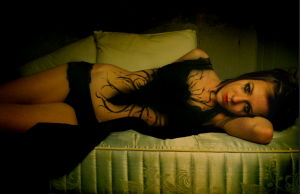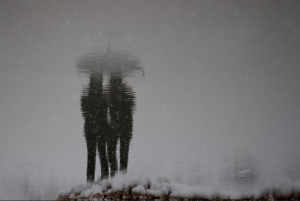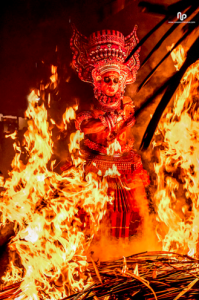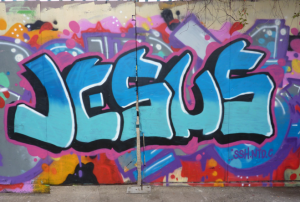Years ago when I got the idea to write a novel, I did what a lot of new writers do and created the uber perfect protagonist. In fact, when I came up with the original plot idea for The Devil’s Dance, I cast a Sarah Conner badass…and she was dull as dirt and utterly unlikable.
Yay me.
Bizarrely, when those critiquing didn’t like my protagonist, I made her more perfect thinking that would fix it. Um, no. Made it worse. They went from disliking her to kinda wanting to stab her in the face.
Why did I do this? Why did I default to super perfect?
Fear.
Fear of being authentic. I had no concept of what it was like to be perfect. My family resembled Season Two of the Jerry Springer Show. After my parents divorced, my dad disappeared for years only to resurface and take a job as a cashier at Stop-N-Go so he could get out of paying the originally allotted child support. I was never #1 at anything (unless one counts truancy). Terrible at sports, last to be picked and the first to get nailed in the face in a game of dodge ball. I dropped out of high school…TWICE.
When it came time to write a story, I wrote the version of me that never was and likely never would be. She was…perfect.
And again, dull as dirt.
For a long time I was tremendously embarrassed about all the best material for a great story (stuff I knew, had experienced in MY life). In short, I was afraid to be authentic. So, after countless versions of my perfect character, I relegated her to the recycle bin and started again with a new character…Romi.
I discovered that I was far better at writing messed up people with imperfect lives, lots of baggage who were working through pain in imperfect ways.
Thus, today, I have a guest who is one of my closest friends and has been critique partner of mine for years, Lanette Kauten. She loves literary fiction almost as much as I love tormenting her for loving literary fiction. But Lanette is excellent at creating very flawed and interesting characters with lots of layers, so who better to ask to guest post about writing authentically?
Take it away, Lanette!
****
Writing is a great adventure because we get to explore worlds and characters, diving into the psychology of humanity. And we long to share these wonderful stories we’ve created with the world!
In doing so, it’s natural to put a piece of ourselves, our worldview, into the stories. We want to share things—a belief or a bit of wisdom—but the question is how to do it without sounding didactic. Religious writers have a reputation of moralizing their stories and not coming across as authentic.
Is that a fair criticism? Maybe for some, but it’s not a brush that can be applied liberally.
Look at Dean Koontz. He’s a Catholic, and his books are amazing! Sometimes his readers can detect his overall worldview in his stories, but not always. He simply churns out good stories. Though he did write the most kick-ass salvation scene in his “Prodigal Son” series. Let’s also not forget about the works of two other great writers who happen to be Christians—Tolkien and Flannery O’Connor.
But what about books with other religious elements?
I’m glad you asked because now we’re getting to the crux of this post. Life of Pi is not a Hindu novel. The Kite Runner is not a Muslim novel.
Both of those books portray beautiful stories, and are simply novels told from the worldviews of their respective authors. Yes, the main characters have religious beliefs. It’s part of who they are, and to deny it on the one hand or to make the stories all about that on the other wouldn’t have been authentic. And readers would’ve tossed the books aside without ever thinking about them again rather than gush about how great those two books are.
My novels are written from my worldview, but anyone would be crazy to call them “Christian fiction.” My characters are a part of the world they live in and act accordingly.
I don’t attempt to hide from real life or shove my characters into a derivative little box. In one of my books, the main character is a confused atheist who escaped from her upbringing in a weird, Charismatic church. Even though she wants nothing to do with her parents’ religion, one of her closest friends is a Jesus freak guru who owns a club in an art district, and one of his employees is a pothead who believes just as strongly in aliens as he believes in Jesus.
The book isn’t about her struggle with religion, but it’s a part of who she is. To cut all that out wouldn’t be true to her or to the story. However, to make the story about religion wouldn’t be honest either. Here I am as a Christian with a book about an atheist in a lesbian relationship, struggling to figure out where she belongs in this world. I don’t shy away from realistic people and situations.
For me, authenticity is key.
Readers are smart and can detect a false note as easily as hearing a wrong note played in their favorite song. It doesn’t matter what worldview you bring to your story (we all bring our beliefs and experiences into our stories); whether we’re Christian, Muslim, Buddhist, Pagan, Atheist, or whatever, we are wise to be authentic. We must strive to be honest in order to show the world as it really is.
Great. That sounds wonderful. How do we do it?
Be Vulnerable
Share your pain, your loss, your doubts. To be human is to feel. Dump your emotions on that page. Open up your vein and bleed. (Not literally. Please don’t bleed on your computer. It’s sticky.) Don’t shy away from the difficult questions because many of your readers will pick up on that and will feel cheated, and don’t edit your emotions as you write. Editing comes later.
Personalize It
This is similar to vulnerability, but here is where you get to shine. Share your worldview as something personal to you. Beliefs have broad implications, but they also have personal elements. Open up the beauty of that world to us in a way that feels real by focusing on the minute details. So often the smallest things have the biggest impact.
Know Your Characters
Your characters are key to showing their own authenticity. Let’s say you’re writing a Christian book, and your character is in a difficult position. Maybe she learned that a friend stole some money and that friend knows a secret about her. If she reports her friend, she knows her secret will be out.
What would your character do? Don’t think about the moral lesson you want to impart, but think about her personality, beliefs, what drives her, and how big the secret is (the bigger, the better) and have her act as she naturally would.
I write literary and some women’s fiction, so my novels are grounded in real life, yet when I say you have to show the world as it really is, I don’t just mean contemporary or literary fiction. You can write fantasies or sci-fi with amazing new worlds, but what is that secret ingredient that elevates the forgettable story to the unforgettable one? Writing our characters and stories with honesty.
***
Thank you, Lanette! I hope y’all will check out her books and befriend her on Facebook. Also Lanette will be at Jamie Lynn Boothe’s launch party on Facebook tonight so I hope y’all will come by.
What are your thoughts? What resonates with you? What do you try to impart onto your characters to make them “real”? Are you like I was and terrified to be imperfect? It’s cool. We all do it. And, frankly, perfect characters also serve a role in other types of fiction (I.e. James Bond), so I don’t want to pick on them too much. Do you enjoy authenticity or prefer the escape of perfection? No wrong answers, btw.
I LOVE hearing from you and comments for guests count double in my contest.
****Just FYI, in an effort to combat spammers your comment won’t appear until I approve it, so don’t fret if it doesn’t appear right away.
Talk to me! And MAKE SURE to check out the classes below and sign up! Summer school! YAY!
And to prove it and show my love, for the month of JUNE, everyone who leaves a comment I will put your name in a hat. If you comment and link back to my blog on your blog, you get your name in the hat twice. What do you win? The unvarnished truth from yours truly.
I will pick a winner once a month and it will be a critique of the first 20 pages of your novel, or your query letter, or your synopsis (5 pages or less).
NEW CLASSES!
Obviously, I have my areas of expertise, but I’ve wanted for a long time to fill in some gaps on classes I could offer.
Cait Reynolds was my answer.
She is an unbelievable editor, mentor and teacher and a serious expert in these areas. She consults numerous very successful USA Today and NYTBS authors and I highly, highly recommend her classes.
OMG, Like How to Write Fleek YA July 7th $40 with Cait Reynolds
How to Dominate Your Sex Scenes (No Safe Words Here) July 14th $40 w/ Cait Reynolds
Gaskets and Gaiters: How to Create a Compelling Steampunk World July 21st $35 w/ Cait Reynolds
Lasers & Dragons & Swords, Oh MY! World Building for Fantasy & Science Fiction
July 28th w/ Cait Reynolds $35/ GOLD $75/ PLATINUM $125
Classes with MOI!
Plotting for Dummies July 13th $35 ($250 for GOLD)
Blogging for Authors July 20th $50 ($150 for GOLD)
Branding for Authors July 27th $35
OTHER Classes with Cait Reynolds
Research for Historical Romance Writing – Or, How NOT to Lose Six Hours on Pinterest July 8th $35 for Basic/ $75 for GOLD / $125 for PLATINUM
Shift Your Shifter Romance into High Gear July 15th $35 Basic/ $75 GOLD/ $125 PLATINUM
Classes with Lisa Hall-Wilson
Growing An Organic Platform On Facebook July 22nd $40













15 comments
3 pings
Skip to comment form
Great article! I write spy thrillers with a 40+ year veteran field operative. I am the public face of our partnership, and while we’re about writing both fiction and non-fiction, he is still a senior member of the intelligence community, so secondary to everything is protecting him in that capacity. Mentally, we are all about being invulnerable. That bleeds over into our writing, and one of the hardest things — certainly for him — is allowing our characters to be vulnerable and to make mistakes. It’s counter to everything he protects against in his real world, yet it is to important. The fact is that field operatives are so good at what they do because they don’t make mistakes, and they aren’t as vulnerable as the average person. Emotions must be dampened, and personalities set aside for the good of the mission. So we spend many conversations coming up with believable flaws and vulnerabilities for our characters, and we don’t always succeed at it like we’d like to. Still working on it, though. It’s hard to make realistic relatable characters out of people who really aren’t like everyone else, but, hey, that’s why writers get the big bucks, right? 🙂 . . . Thank you for your article. Flaws make the character, for sure.
Thanks for commenting, Piper. You have quite the challenge because in some professions, mistakes equal death. That kind of stress must take a toll on a character’s personal life. 😉
This is terrific advice, and I can see how it would build more authentic, likable characters.
Comparing this advice to what I’ve been reading lately, and I think it might not be as widely employed in all genres. More by degrees.
Some genres like the raw and flawed MC more than others. But all genres like the MC to be relatable. The question is always how to do it. How to make the flaws add to the character rather than too dumb to breathe.
I love a good, flawed character, but only an interesting one. I was reading a book that involved a girl dating a sociopath who had a bone to pick with her mother. Very boring, predictable bad decisions amid gorgeous prose.
Speaking of religion in writing, Ann Rice draws some incredible parallels. Vampire history that mirrors Jewish history. I know that’s not exactly what Lanette was talking about, but its fascinating nonetheless.
You’re so right, Lanette. My main character had flaws but they weren’t believable until I started dredging up some instances in my own life to transfer to hers. Instant believability, at least for what I’ve written so far. All bets are off when I start involving her in the supernatural/mythic/mystic sections of the novel. I hope I’ll be able to take my MC’s flaws with her into this other realm and make things really difficult for her, both physically and emotionally. After all, conflict is story.
Since you mentioned Dean Koontz – he is one of my favorite authors. And this is why. He writes Horror – not my favorite genre. But in the midst of horror he GETS REAL. He works in deep philosophical conversations about life issues we all stop and think about now and then because we have to. He doesn’t shove Xtian beliefs down your throat while he is at it. It is a complete discussion, a moral thought pattern, that gets you thinking or says something memorable in conclusion and there are times he does it in one line of dialogue. I want to be able to write like that when (if) I grow up!
in my first draft, the main character was so naive and made poor choices; so much so that it super irritated one of my honest beta readers. I didn’t intend to do that (obviously). I think it was just where I was coming from. But, through their feedback I got to seeing that my character and story reflected a lot of crap I had in me. As I work out my characters, I guess that I’m working stuff out in myself. Hopefully, as I grow, I can come to a place where the characters are a good balance of flawed and inspiring : )
I walk this world-view tightrope all the time. Excellent points providing lots of food for thought. I’ll have to re-read this (focus, dude…)
It is difficult not to inject oneself into a character. One’s worldview is going to have an effect on the MC.
I love this post! Exactly the kind of writing I like to do. After reading Jamie Lynn’s post about Inspirational Romance, I spent some time on Amazon and discovered that my current novel would be closest to literary women’s fiction–with inspirational and romantic elements. Growing up, I loved to read so many things that I never even knew the differences between all the genres. It’s only since I’ve started writing that I’ve had to learn about all the little “boxes”–who knew that I liked to read and write literary fiction? 🙂
Thanks for introducing Lanette to us! Great post!
Interesting read! Very helpful.
Thank you for a beautiful note for writers.
Loved it. Thanks for intro to Lanette. Will facebook friend. Was your query class June 25th? It said May and would love to take it.
Author
I need to delete that now that it’s passed. I will re-list it though 😀 .
Writing real, harder than it sounds.
Thank you for sharing this article. I enjoyed it a great deal.
[…] via Let’s Get Real—Authenticity in Fiction — Kristen Lamb […]
[…] https://authorkristenlamb.com/2017/06/lets-get-real-authenticity-in-fiction/ Dump those emotions on the page. […]
[…] https://authorkristenlamb.com/2017/06/lets-get-real-authenticity-in-fiction/#respond […]